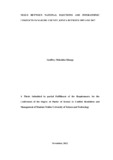NEXUS BETWEEN NATIONAL ELECTIONS AND INTER-ETHNIC CONFLICTS IN NAKURU COUNTY, KENYA BETWEEN 1992 AND 2017
Abstract
Wars and conflicts determine political boundaries, disperse populations, shape political discussions, and have far-reaching effects on all aspects of human societies. The use of violence is common and can be mobilized for many ends, including but not limited to electoral success. An unstable political climate has persisted in areas with a diverse ethnic makeup ever since the multiparty system was introduced in 1992. This study sought to assess the nexus between national elections and inter-ethnic conflicts in Nakuru County, Kenya since the re-introduction of political pluralism in Kenya in the early nineties. The specific objectives were; to examine the nature of inter-ethnic conflicts occasioned by national elections; to evaluate the strategies used towards addressing inter-ethnic conflicts; and to assess the challenges and opportunities in managing inter-ethnic conflicts occasioned by national elections in Nakuru County since 1992This research helps shed light on how best to manage conflicts that have ethnic undertones, and it suggests strategies for doing so. Government officials and security agents will benefit from this study because it will help them build on their successes and address their failures during the ethnic conflicts that occurred between 1992 and 2008.This study is relevant in contributing new knowledge as well as advising policy makers, locally and internationally. The study was anchored on Primordialism, Instrumentalism and Democratic theories. A descriptive research strategy was used for this investigation. Household heads in the conflict-plagued Kuresoi North and Molo sub-counties were surveyed for this study. An estimated 14,054 participants were needed for this investigation. In-depth interviews were conducted with members of the government, security forces, CSOs, opinion leaders, religious figures, and youth organization representatives. There were 390 participants in the study. Questionnaires, focus groups, and interview guides were used to gather data. Methods of sampling included stratified strategic sampling, simple random sampling, and purposive sampling to collect data from household heads and important informants, respectively. Quantitative data is provided in the form of charts, graphs, and tables, while qualitative data is organized thematically. Data analysis was performed using the Statistical Package for the Social Scientists (SPSS). The findings revealed the causes of conflict being diverse and dynamic constructed along historical disputes over land ownership, incitement by politicians and tribal leaders through hate speeches and negative media influence. The state, as the primary actor in conflict resolution, has switched its attention from nationwide to local levels of government for action. However, in order to attain peace, existing obstacles such as marginalization perception, mass mobilization, displacement, and militia/gangs must be addressed. The research found that negative ethnicity, external actors, and insufficient public involvement all played a role in sparking inter-ethnic conflict and affecting the outcome of county national elections in Nakuru. Problem-solving seminars with at-risk populations were recommended. The report also suggested ways to combat negative ethnic attitudes, such as better coordination and integration through strengthened inter-ethnic forums and local peace building blocks.

